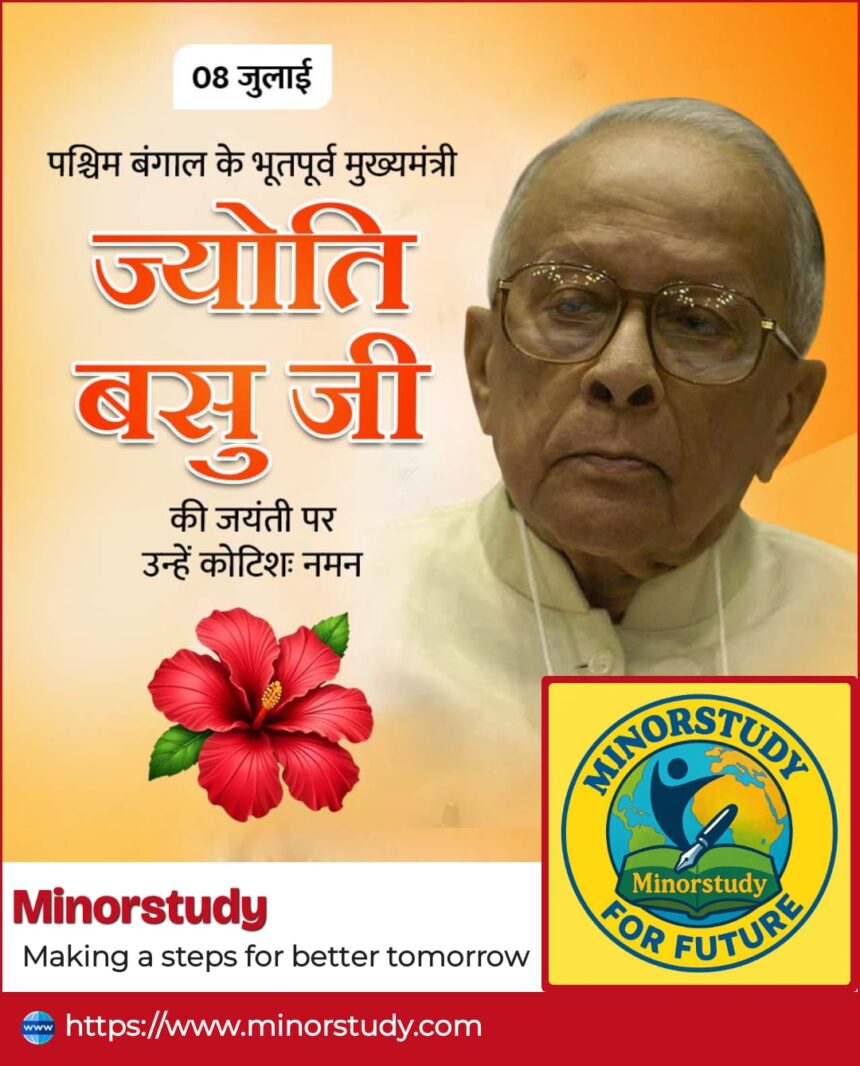🟥 9 Bold Facts That Prove Jyoti Basu Ji’s Leadership Changed Indian Politics Forever
Jyoti Basu Ji was more than just a politician — he was a phenomenon in Indian political history. As one of the longest-serving chief ministers in Indian history, his leadership, ideology, and personal simplicity made him an unforgettable icon of governance. Through his tenure, India witnessed how Marxist principles, when implemented with pragmatism, could provide stability, equity, and administrative depth.
- 📜 History of Jyoti Basu Ji
- 🗓️ Timeline of Jyoti Basu Ji’s Life
- 📚 Facts About Jyoti Basu Ji
- 1. Longest-serving Chief Minister in India
- 2. The “reluctant Prime Minister”
- 3. Pioneer of Land Reforms
- 4. A Marxist with a practical mind
- 5. A Secular Statesman
- 6. Champion of Federalism
- 7. First Politician to Donate Body for Medical Use
- 8. Instrument of Educational and Electoral Reforms
- 9. Loved and Respected Across Political Lines
- 🎯 Significance of Jyoti Basu Ji’s Leadership
- 🔺 Stability in Governance
- 🔺 Empowerment of Farmers and the Marginalized
- 🔺 Cultural Flourishing
- 🔺 Balancing Ideology and Administration
- ❓ FAQs About Jyoti Basu Ji
- Q1. What was Jyoti Basu famous for?
- Q2. Did Jyoti Basu refuse to become the Prime Minister?
- Q3. What were his contributions to land reforms?
- Q4. When did Jyoti Basu pass away?
- Q5. What values did he stand for?
- 💐 Wishing & Honouring Jyoti Basu Ji
- 🌱 Importance in Our Daily Life
- 📌 Important Observance Points
- 🧠 Conclusion: His Timeless Impact
Let’s explore the life, contributions, facts, timeline, impact, and spiritual essence of Jyoti Basu Ji — written in a warm, human-centric voice that brings out the spirit of the man behind the politics.
📜 History of Jyoti Basu Ji
Jyotirindra Basu, lovingly known as Jyoti Basu, was born on 8 July 1914, in Calcutta (now Kolkata) into an upper-middle-class Bengali family. His father, Nishikanta Basu, was a doctor — a profession he hoped his son would follow. But destiny carved a different path.
Basu studied at St. Xavier’s College, Kolkata, and then moved to London for legal studies at the Inns of Court, where he came in contact with communist ideology through the Communist Party of Great Britain. This was a turning point. Basu returned to India not just as a barrister, but as a politically awakened Marxist, determined to fight for the working class.
🗓️ Timeline of Jyoti Basu Ji’s Life
| Year | Event |
|---|---|
| 1914 | Born in Kolkata |
| 1935-40 | Studied Law at London’s Middle Temple |
| 1940 | Returned to India; joined the Communist Party of India (CPI) |
| 1946 | Elected to Bengal Legislative Assembly |
| 1964 | Became a founding member of CPI(M) after split |
| 1977 | Became Chief Minister of West Bengal |
| 1996 | Refused Prime Ministership (historical decision) |
| 2000 | Retired from politics |
| 2010 | Passed away on January 17 in Kolkata at age 95 |
📚 Facts About Jyoti Basu Ji
1. Longest-serving Chief Minister in India
Basu served as the Chief Minister of West Bengal from 1977 to 2000, for an incredible 23 years — the longest term for any CM in Indian history.
2. The “reluctant Prime Minister”
In 1996, Jyoti Basu was the unanimous choice for Prime Minister of India by the United Front. However, his own party CPI(M) vetoed the offer, a decision he later termed as a “historic blunder.”
3. Pioneer of Land Reforms
Under his rule, the Operation Barga program was implemented, giving sharecroppers legal recognition — a landmark act in agrarian reform.
4. A Marxist with a practical mind
Although ideologically Marxist, he governed with pragmatism, not dogma. He attracted foreign investment and modernized administration while maintaining the core socialist values.
5. A Secular Statesman
He kept communal harmony at the core of his governance and resisted the rise of religious extremism in a politically turbulent India.
6. Champion of Federalism
He was vocal about state autonomy and was often at the forefront of federal debates, especially regarding the center-state financial relations.
7. First Politician to Donate Body for Medical Use
In a progressive and selfless act, Basu donated his body for medical research after death — inspiring thousands.
8. Instrument of Educational and Electoral Reforms
He pushed for decentralization, panchayati raj, and universal primary education — strengthening the grassroots of democracy.
9. Loved and Respected Across Political Lines
From Left to Right, Jyoti Basu earned respect for his vision, simplicity, and unwavering dedication to democratic processes.
🎯 Significance of Jyoti Basu Ji’s Leadership
🔺 Stability in Governance
In a state known for political volatility, Jyoti Basu brought administrative continuity, stability, and a calm hand in turbulent times.
🔺 Empowerment of Farmers and the Marginalized
His land reforms turned West Bengal into a model of rural equity, inspiring other states to rethink land rights.
🔺 Cultural Flourishing
Under Basu’s rule, Bengal’s cultural scene bloomed — with literature, arts, and theatre getting state support.
🔺 Balancing Ideology and Administration
He proved that ideology can coexist with modern governance — creating a unique leftist model not seen elsewhere in India.
❓ FAQs About Jyoti Basu Ji
Q1. What was Jyoti Basu famous for?
He was famous for being the longest-serving Chief Minister of India and a key leader of CPI(M) who shaped the socio-economic landscape of West Bengal.
Q2. Did Jyoti Basu refuse to become the Prime Minister?
Yes, in 1996, the CPI(M) refused to allow him to become PM despite support from the United Front — a decision he regretted.
Q3. What were his contributions to land reforms?
His Operation Barga program legally recognized sharecroppers and redistributed land, significantly improving the lives of farmers.
Q4. When did Jyoti Basu pass away?
He passed away on January 17, 2010, at the age of 95.
Q5. What values did he stand for?
Socialism, secularism, democratic rights, and empowerment of the poor and marginalized.
💐 Wishing & Honouring Jyoti Basu Ji
🌹 On this day, let’s honor Jyoti Basu Ji — a titan of Indian politics who led not with pomp, but with purpose.
🙏 May his ideals of justice, equality, and good governance continue to inspire generations of leaders and citizens.
📣 Let us celebrate his birthday (July 8) each year as a day of dedication to public service and equity.
🌱 Importance in Our Daily Life
While today’s politics may be riddled with short-term gains, Jyoti Basu’s style of governance reminds us of long-term planning, ethics, and people-first leadership.
Here’s how his legacy impacts your life even today:
✔ Panchayati Raj system in your village? Thank Basu for pioneering its implementation.
✔ Right to vote and land ownership for farmers? He made it happen for millions.
✔ Focus on secularism and inclusiveness? He championed those values when they were under threat.
✔ Simple leaders with big dreams? Jyoti Basu was one of the last of them.
📌 Important Observance Points
| Theme | Details |
|---|---|
| Full Name | Jyotirindra Basu |
| Birth Date | 8 July 1914 |
| Death | 17 January 2010 |
| Key Roles | Chief Minister (West Bengal), Founding CPI(M) Leader |
| Major Legacy | Land reforms, Panchayati Raj, Secularism |
| Known For | Longest-serving CM, Historic PM refusal, Clean governance |
| Political Party | CPI(M) |
| Awards/Recognition | Nationally revered, loved across party lines |
| Ideal Celebration | Observing Public Service Day, Debates on Good Governance |
🧠 Conclusion: His Timeless Impact
Jyoti Basu Ji life was a masterclass in leadership — where humility met conviction, ideology met adaptability, and politics served the people.
Even in an era of polarizing narratives, Basu’s name evokes balance, progress, and deep respect. He never chased power, yet power respected him. He never shouted slogans, yet his silent reforms echoed across the nation.
His story reminds us:
“Politics is not about power, it’s about responsibility.”
In today’s world, filled with political noise, Jyoti Basu’s simplicity and wisdom remain a soft but powerful whisper — urging us to lead better, live better, and govern better.









Ищешь автозапчасти? каталог-avtoru — автотовары предоставляем широкий ассортимент автозапчастей, автомобильных аксессуаров и оборудования как для владельцев легковых автомобилей, так и для корпоративных клиентов. В нашем интернет-магазине вы найдете оригинальные и неоригинальные запчасти, багажники, автосигнализации, автозвук и многое другое.